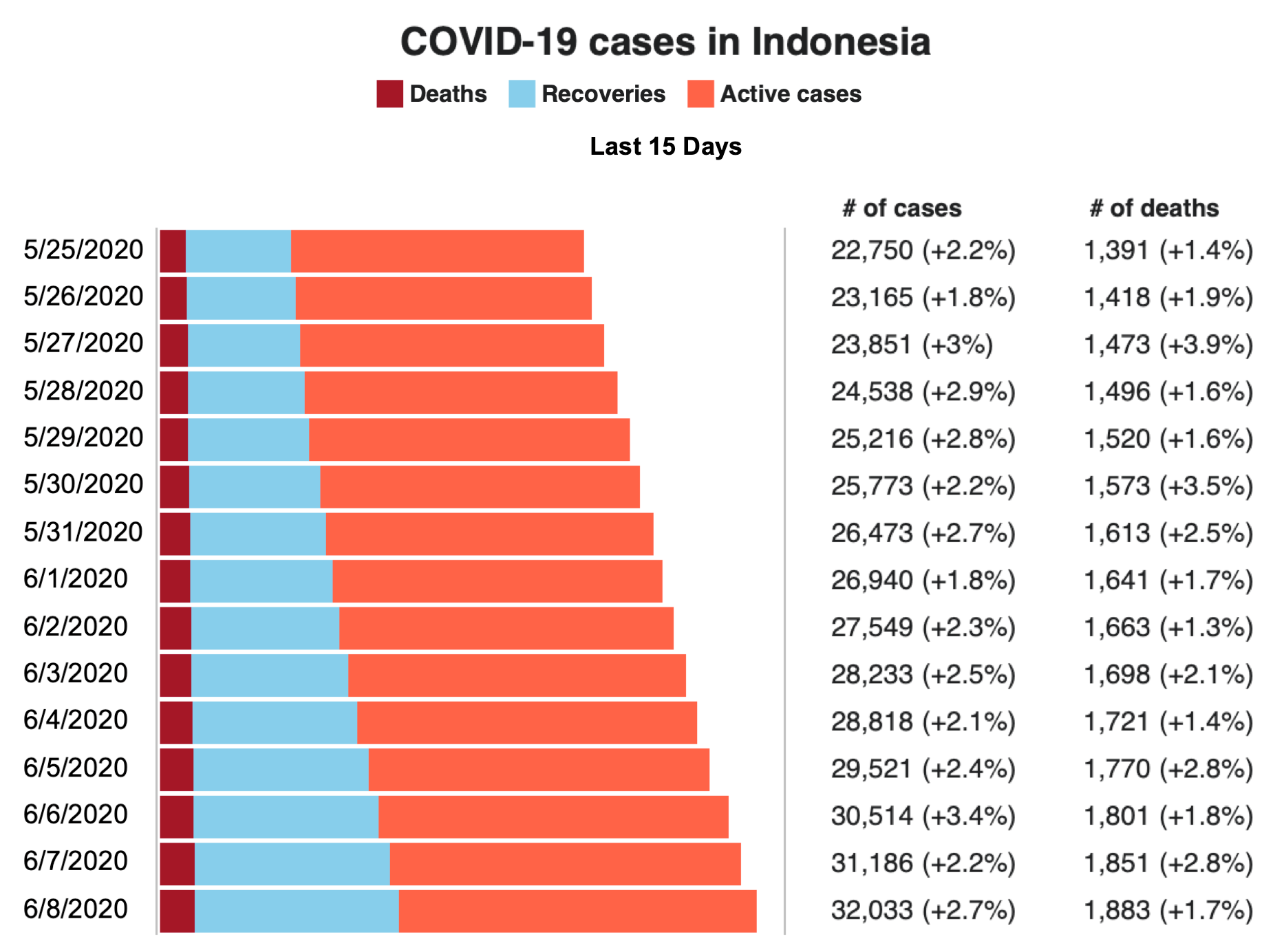Indonesia Coronavirus Update #15 June 8, 2020
Number of reported cases: 32,033 (as of June 8) 1883 Deaths 10,904 Recoveries
Rupiah to US$ 13,956
Jakarta Stock Exchange Index: 5070.56

- Nationwide Case Detections Trend Downward The moving average of daily Covid19 cases detected nationwide trended gradually downward for the second consecutive week, but there remain hotspots (i.e. East Java). The number of active cases nationwide grew by eight percent week-on-week, the slowest rate to date. In East Java, the active-case growth slowed, while in Jakarta and West Java it turned slightly negative. Small provinces registering swift growth include Papua, West Nusa Tenggara (NTB) and South and Central Kalimantan. The largest increase of new cases in a single day occurred on 6 June, when 993 cases were announced. On 5 June, for the first time ever, there were more than 550 recoveries recorded just within a span of 24 hours. Polymerase chain reaction (PCR) testing reached nearly 7,059 per day on a three-day moving average basis as of 2 June. The positivity rate had fallen to eight percent. President Joko Widodo called on the government to raise PCR testing capacity to 20,000 tests per day, which would still be well below the minimum level recommended by the World Health Organization
- President Holds First In-Person Meeting: On June 8th President Joko Widodo held the first offline, limited meeting since the Covid-19 pandemic struck in the middle of March. To ensure the implementation of health protocols, participants were obliged to maintain a safe distance during the session. during the pandemic, the president established virtual meetings.
- School Re-Opening Plan Still Being Formulated Vice President Ma’ruf Amin said the government was still canvassing its plan to reopen schools amid the COVID-19 pandemic. Ma’ruf added when schools were eventually allowed to resume activities, the reopening would be carried out in stages. For example, he said, the capacity of students of junior and senior high schools would be limited to half its normal. Elementary schools, meanwhile, could remain closed. “But this plan is still being reviewed, we are looking into all of the possibilities,” he said in a virtual conference with journalists on Monday, June 8, 2020. Schools reopening in green zones, where no COVID-19 case were reported, would be conducted under stringent procedure, Head of the Cooperation and Public Relations of the Education and Culture Ministry Evy Mulyani said. “Our priority is the health and safety of school community (students, teachers and parents) hence schools in the green zone areas could not be opened instantly. It should be done carefully and follow the health protocol,” Mulyani said in her statement on Sunday. Schools which are located in yellow and red zones would still use the online learning system for the new academic year 2020/2021.
- Unemployment Numbers: The Indonesian government noted that the number of layoffs caused by COVID-19 pandemic had reached 3.05 million as of June 2, 2020. The National Development Planning Agency (Bappenas) previously estimated that this year’s unemployment would jump by 4.2 million. The figure could be higher considering the number of job seekers is quite high.
- In-Country Travel Requirements: In general, travelers are required to abide by and implement health protocols, including wearing face masks and following physical distancing measures during their trips. Those intending to go on inter-provincial trips using public transportation are required to show their ID cards, health certificates stating they are COVID-19-negative after undergoing polymerase chain reaction (PCR) or rapid tests and have the government-made Peduli Lindungi app installed and activated on their mobile phones at the time of departure. “People living in areas that do not provide PCR or rapid test facilities can present health certificates showing they are free from influenza-like illnesses issued by hospitals or community health centers [Puskesmas],” the letter said. These requirements have been difficult to meet and one local airline, Lion Air, suspended their flights for a time as a result.
- International Travel Requirements (PCR Tests Now Required When Entering): Indonesia issued new health protocols for international arrivals at all its ports of entry, requiring everyone to undergo PCR testing and quarantine in government facilities. Previously, anyone entering the country only needed to present the health certificate stating they were not infected with the virus and were able to proceed with self-quarantine in their final destination. While waiting for the test result of PCR, foreigner(s) must undergo quarantine at hotel designated by Indonesian Authorities. Lodging and meal expenses shall be borne by the foreigner(s) and/or the employer(s).
Non-Indonesians who are eligible to enter the country must belong to the following categories:
- Is a diplomatic visa holder;
- Hold permanent residency permit or limited residency permit; Holds a service visa – service visas are given to individuals on assignment to Indonesia for non-diplomatic purposes;
- Hold diplomatic visa residency permits or service residency permits;
- Employees working on strategic national projects;
- Are transport crew (air, land, and sea); and
- Are engaged in medical, food, and humanitarian work.
The aforementioned visitors must also not have come from a COVID-19 affected country within the last 14 days from their date of arrival to Indonesia





